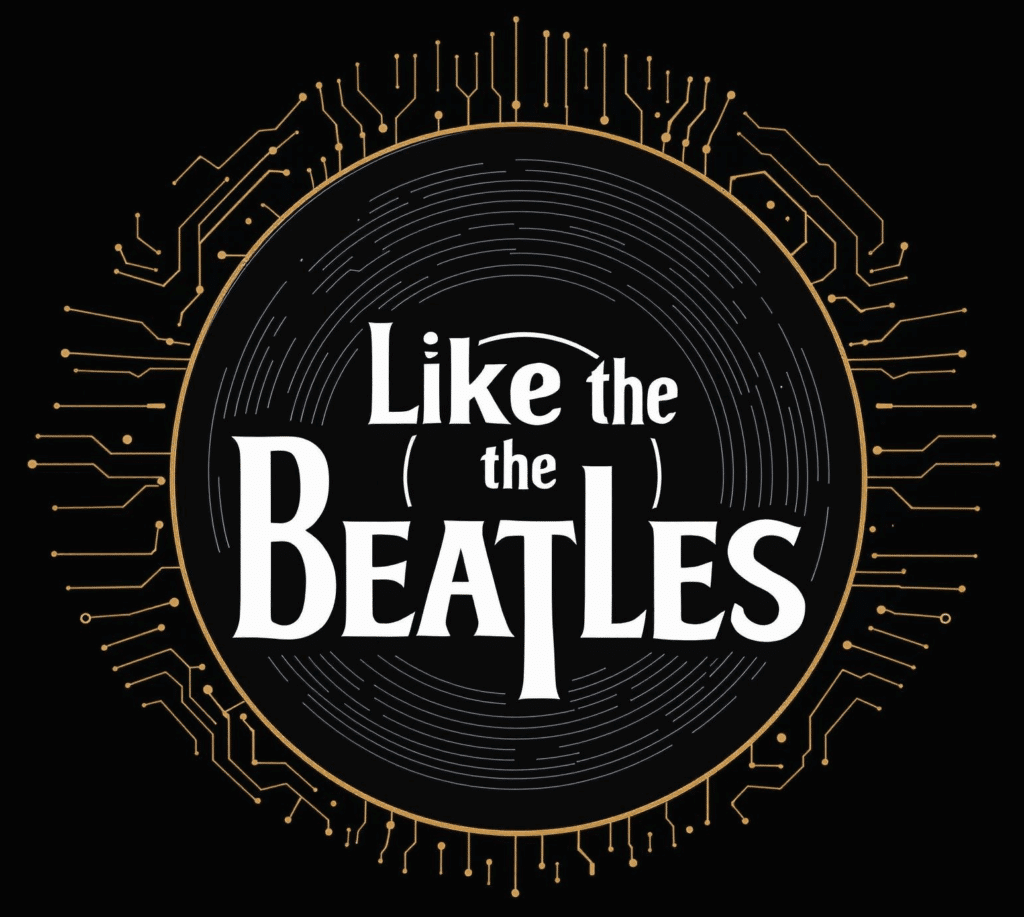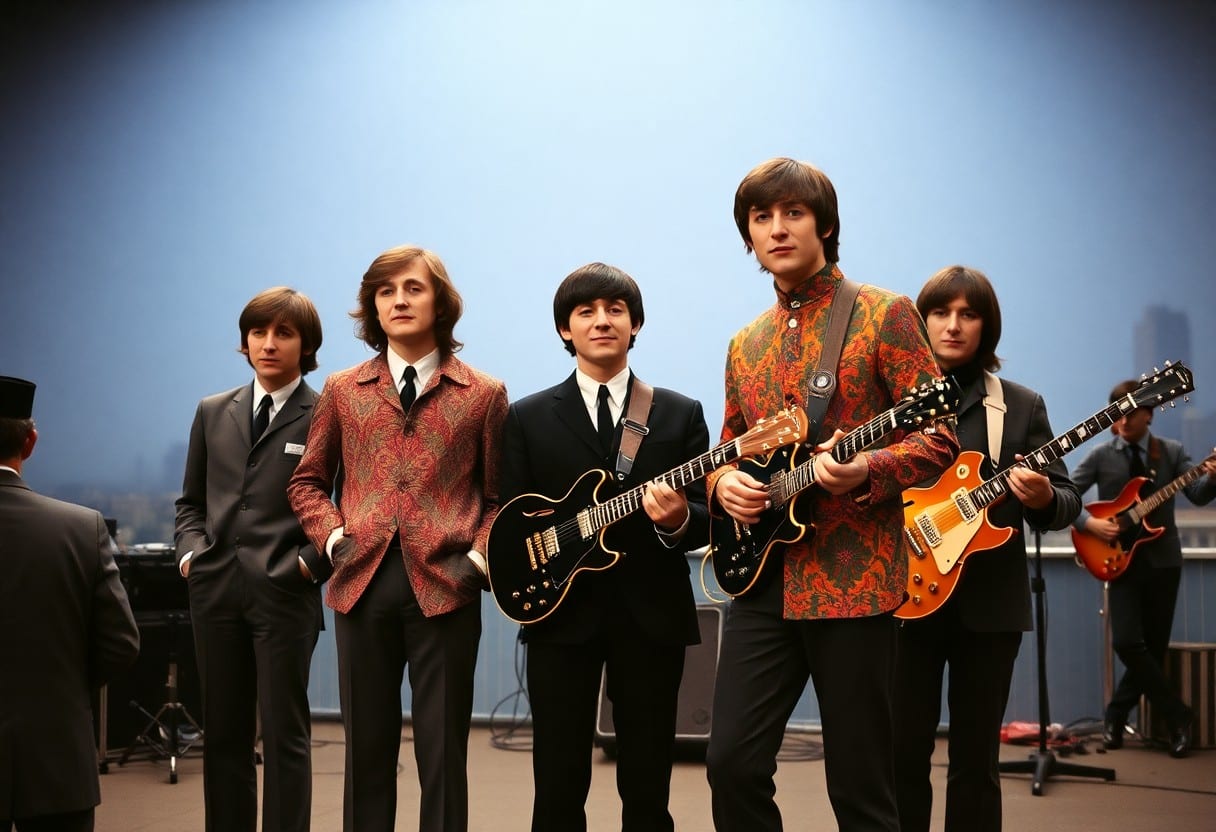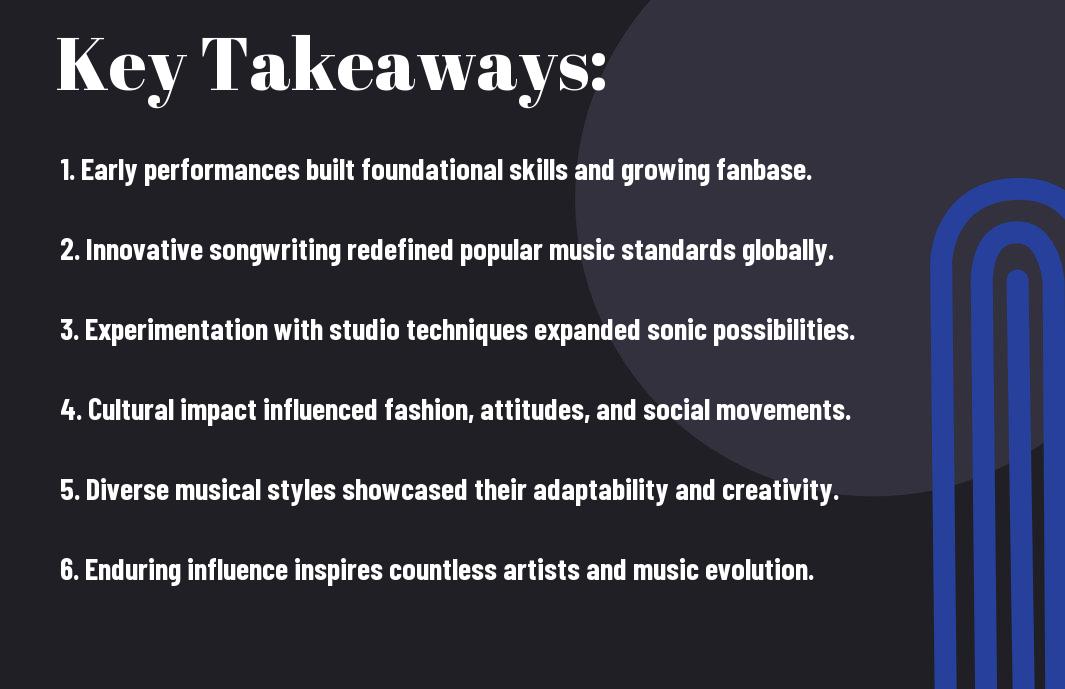Beatles enthusiasts and newcomers alike often marvel at the band’s enduring influence on music and culture. As I explored their evolution, I uncovered five significant steps that illustrate how they transformed from a local Liverpool band into worldwide icons. In this post, you’ll understand the pivotal moments that defined their journey, showcasing the positive changes and challenges they faced along the way. Join me as we investigate into the legacy of The Beatles and uncover the crucial milestones of their remarkable career.
The Early Years: Formation and Influence
Your understanding of The Beatles begins with their formation in Liverpool during the late 1950s. This vibrant period was marked by the convergence of various musical influences that shaped their sound and identity. The band’s initial spark was fueled by their shared love for rock ‘n’ roll, rhythm and blues, and skiffle music. As they navigated local clubs and honed their skills, each member brought a unique flair to their evolving artistry, laying the foundation for the legacy that would follow.
The Original Lineup
Early in their journey, John Lennon, Paul McCartney, George Harrison, and drummer Pete Best made up the original lineup of The Beatles. This combination set the stage for their distinct sound and collective creativity, showcasing their combined talents that transformed popular music. The right mix of personalities and musicianship made it clear that they were destined for greatness.
Early Musical Influences
Across their formative years, The Beatles were greatly influenced by rock ‘n’ roll legends like Elvis Presley and Chuck Berry, as well as rhythm and blues artists such as Little Richard and Buddy Holly. These musical icons inspired their songwriting and performance style, pushing them to create their own unique blend of catchy melodies and harmonies.
Consequently, The Beatles absorbed a wide range of influences that shaped their musical direction. They explored genres like skiffle, which was rooted in British folk music, and American rock and roll, which instilled in them the energetic stage presence that would later captivate audiences worldwide. These early influences not only honed their craft but also ignited a passion for songwriting that would lead to iconic tracks. The blending of varying styles fueled their creative process, enabling them to evolve into one of the most significant music acts in history.
Breakthrough Success: Beatlemania
Now, it’s hard to overstate the intensity of Beatlemania, a phenomenon that took the world by storm in the early 1960s. Fans were not just eager for the music; they were passionately devoted to every aspect of The Beatles’ lives. From frenzied crowds to sold-out concerts, the sheer excitement they generated transformed the landscape of pop culture forever. This era marked a seismic shift in how music was consumed, setting the stage for future global superstars.
The Chart-Topper Era
Beside their electrifying performances, The Beatles dominated the charts, scoring hit after hit with seemingly effortless creativity. Songs like “I Want to Hold Your Hand” and “She Loves You” catapulted them to unimagined heights, solidifying their status as the leading band of the time. As their music evolved, so did their audience’s expectations, eagerly anticipating each new release and setting records that would stand for decades.
Cultural Impact of Beatlemania
After their breakthrough, the cultural shift ignited by Beatlemania cannot be overstated. As I observe the era, I realize how The Beatles served as a voice for a generation, challenging norms and inspiring movements. Their music not only entertained but also ushered in changes in fashion, social attitudes, and even politics, leaving an indelible mark on society.
Understanding the cultural significance of Beatlemania means recognizing its broad influence beyond mere music. The Beatles challenged traditional gender roles and social expectations, embodying a spirit of freedom and creativity that resonated with young people around the world. Their innovative approach to music and self-expression inspired countless artists while simultaneously capturing the essence of a revolutionary era. From fashion trends to lifestyle changes, The Beatles’ legacy continues to shape youth culture today, serving as a testament to the transformative power of music in society.
Evolution of Sound: Experimentation and Innovation
Keep in mind that The Beatles were pioneers in their approach to music, pushing boundaries and exploring new sounds that shaped the landscape of popular music. Their journey involved a fearless willingness to experiment and innovate, captivating audiences with each release and cementing their place in music history.
Studio Techniques and Advancements
Any serious examination of The Beatles’ evolution highlights their adept use of advanced studio techniques. They took advantage of emerging technologies, such as multi-track recording, which allowed for complex layering of sounds. This innovation not only enhanced their music’s richness but also influenced countless artists who followed.
Genre Blending and Lyrical Maturity
The Beatles showcased a remarkable ability to blend genres, often mixing rock, pop, folk, and even Indian music influences into their work. Their lyrical maturity evolved significantly over time, addressing themes of love, life, and social issues with unprecedented depth.
This genre blending and lyrical maturity were not just about creating a unique sound; it reflected a deeper narrative in their music that resonated with fans. I find it fascinating how they transitioned from the straightforward love songs of their early days to more introspective and socially conscious lyrics. The incorporation of various styles allowed them to explore different themes, adding layers of meaning that made their music relevant and impactful. It’s a testament to their growth as artists, showing that they were not just entertainers, but profound storytellers who used their platform to mirror the changing world around them.
Social and Political Influences: The Counterculture Movement
Unlike earlier decades, when music often served purely as entertainment, The Beatles emerged during a time of profound social and political upheaval. Their sound and message resonated with the burgeoning counterculture movement, reflecting the desires and frustrations of a generation yearning for change. With their rebellious spirit and innovative music, The Beatles played a pivotal role in shaping and embodying the values of this transformative era.
Responses to Social Changes
Between the rise of the youth culture and the escalating Vietnam War, The Beatles adapted their music to address the shifting social landscape. Their lyrics and public personas began to encompass themes of love, peace, and rebellion. This evolution not only mirrored societal changes but also inspired countless fans to engage in activism and think critically about their world.
Engagement with Political Issues
Issues of war and peace, civil rights, and social justice permeated their work, particularly in the late 1960s. The Beatles recognized their influence and used their platform to advocate for change.
With songs like “Revolution,” I witnessed how they aligned themselves with the growing anti-war sentiment, encouraging listeners to consider their roles in promoting peace. Some members, notably John Lennon, became vocal advocates for nonviolent protest and social equality. Their participation in events such as Bed-Ins for peace and the release of public statements against the war pushed boundaries and inspired many to question authority. The Beatles did not shy away from expressing their views on important societal issues, making them an integral part of the counterculture movement.
The Final Chapter: Disbandment and Legacy
All great stories have an ending, and for The Beatles, their disbandment marked both a bittersweet conclusion and an enduring legacy. With each member begining on solo careers, the time they spent together transformed music forever. Their innovative sound and boundary-pushing artistry live on, inspiring generations of musicians and fans alike.
Reasons for the Split
After years of intense collaboration, internal tensions, personal growth, and changing creative paths led to The Beatles’ eventual split. Factors such as financial disputes, differing musical visions, and the pressures of fame created an environment that ultimately became unsustainable, prompting each member to pursue his individual ambitions.
Enduring Influence on Music and Culture
Above all, The Beatles’ influence on music and culture is profound and far-reaching. Their innovative approach to songwriting, recording techniques, and genre-blending established new standards in the music industry, making them a continuous source of inspiration for countless artists across various genres.
This lasting impact can be seen in the evolution of popular music, where artists frequently incorporate elements of The Beatles’ styles. Additionally, their cultural repercussions extend beyond music; they shaped fashion, art, and social attitudes of their time. The Beatles promoted values of peace, love, and rebellion against societal norms, influencing the 1960s counterculture and leaving an indelible mark on the world we live in today.
Final Words
Conclusively, my analysis of The Beatles’ legacy reveals how they evolved through five transformative steps, shaping not only their sound but also popular music as a whole. From their early days in Liverpool to their ambitious experimentation in the studio, each phase showcases their enduring impact. I encourage you to examine deeper into their journey, as understanding these stages can enrich your appreciation of their artistry. The Beatles have carved out a timeless place in music history, and exploring their evolution is a rewarding experience for fans and newcomers alike.












